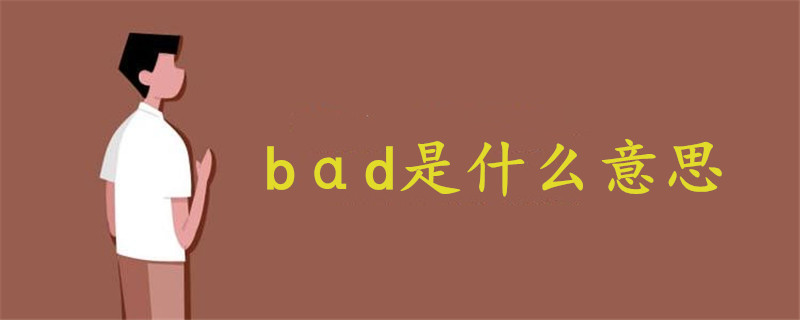bad是什么意思:作为形容词时,中文意思为“令人不快的”、“坏的”、“不善于”;作为名词时,中文意思为“坏人”、“坏事物”;作为副词时,中文意思为“很”、“非常”。

bad的中文含义及用法介绍
1、作为形容词,译为令人不快的;问题成堆的;坏的;质量差的;不合格的;拙于;不擅;不善于。
例句:It was the worst experience of her life.
那是她一生中最糟糕的经历。
I thought it was a very bad article.
我以为那是一篇很低劣的文章。
She is so bad at keeping secrets.
她一点都不会保守秘密。
You're heading for a bad attack of sunburn.
你会被严重晒伤的。
I know that this is a bad time to ask for help.
我知道在这时候要求帮助不合适。
He said I must have done something bad to deserve it.
他说我肯定是罪有应得。
Those shoes are bad for her feet.
那双鞋会伤她的脚。
Ok, we request your party pay for the goods with bad quality.
好的,请看。对不合格的产品我们要求赔偿。
2、作为名词,译为坏人;坏事(物)。
例句:You will always have the bad as well as the good in the world.
人生在世总是有苦有甜。
Too bad if you missed the bus.
你没有赶上公交车只能算自己倒霉。
In the end the 'bad guys' are caught and sent to jail.
最后,“坏人”都被抓住送进了监狱。
3、作为副词,译为很;非常。
例句:She wanted it real bad.
她确实很想得到它。
Are you hurt bad?
你伤得重吗?
I feel bad that he's doing most of the work
大部分工作都是他在干,我觉得很过意不去。
She's been feeling bad all week.
她整整一周都感觉很糟糕。
This gives our country a bad image.
给我们国家造成了非常坏的影响。
They are either bad judges of people or bad at motivation.
他们要么看人非常不准,要么不善于激励他人。










